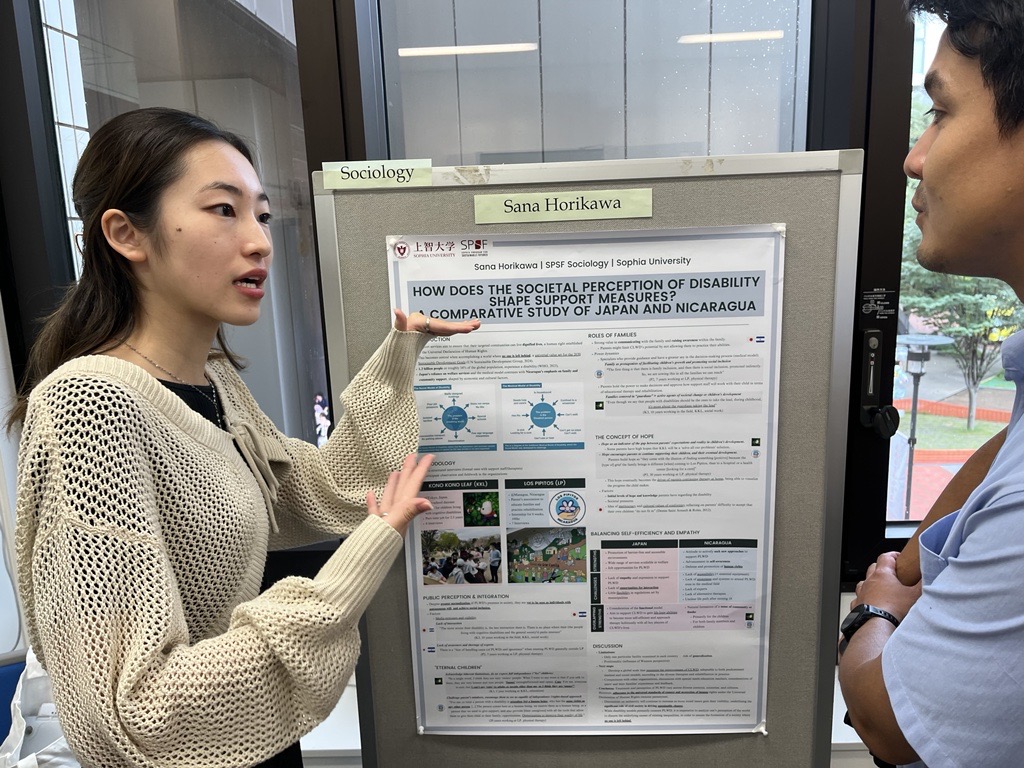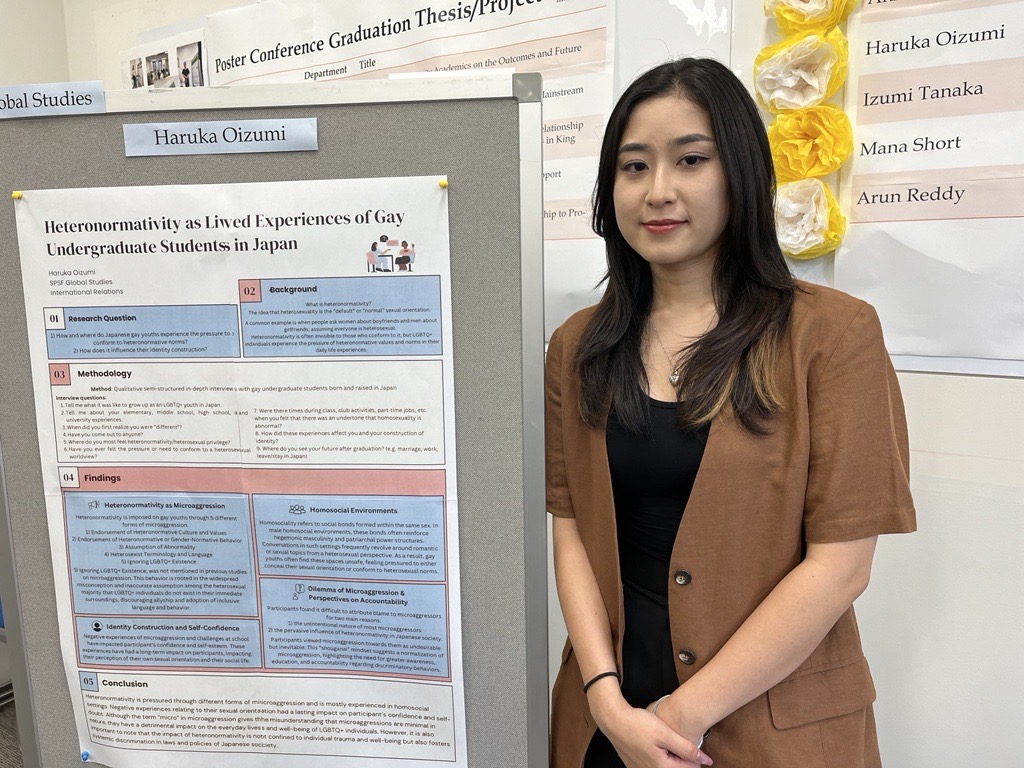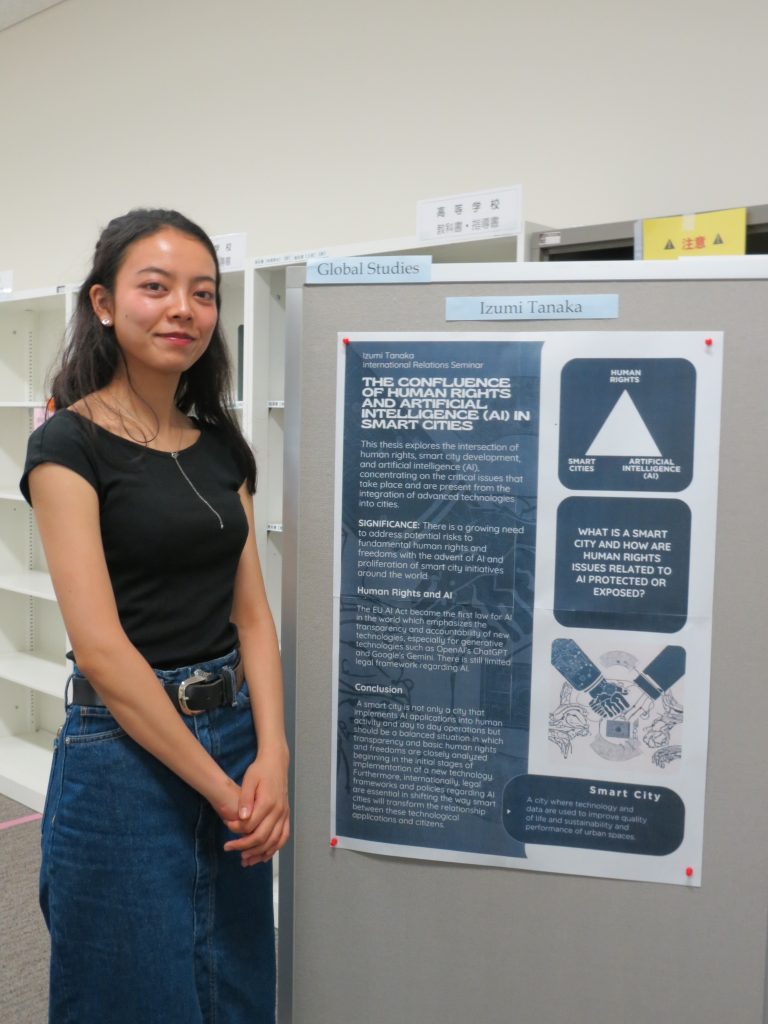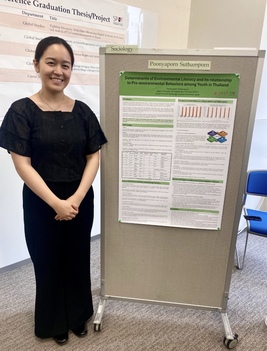

The first SPSF cohorts are expecting their graduation AY2024 in Autumn. Nineteen students completed the thesis/projects in 2024! Here we introduce some of our students’ research.
Sana HORIKAWA, “How does the Societal Perception of Disability Shape Support Measures? A Comparative Study of Japan and Nicaragua”
Haruka OIZUMI “Heteronormativity as Lived Experiences of Gay Undergraduate Students in Japan”
Izumi TANAKA, “The Confluence of Human Rights and Artificial Intelligence (AI) in Smart Cities”
Poonyaporn SUTHAMPORN, “Determinants of Environmental Literacy and its Relationship to Pro-environmental Behaviors among Youth in Thailand”
Sana HORIKAWA from the Dep. of Sociology
How does your thesis/topic relate to sustainable futures?
My thesis aligns with the universal value set of “leaving no one behind”, established by the 2030 Sustainable Development Goals, as it emphasizes inclusivity, integration, and the role of civil society. With this, it aims to highlight the significance and approaches to creating sustainable change and reducing inequalities (Goal 10).

Overall, what SPSF experiences, both positive and challenging, do you want to share with other students?
SPSF is a melting pot of diverse individuals pursuing various life paths. Despite such diversity, I have been able to simultaneously connect with so many people who share similar visions, life experiences, and passions, who I might not have encountered elsewhere. While classes and professors provide us with great insights, discussions with my peers have also allowed me to grow and connect with others as well as with myself in unexpected and profound ways.
Write your short message to prospective students.
Many people often ask me about the difference between SPSF and FLA. From my experience and hearing other people’s too, I would say SPSF is great if you have a clear major you want to pursue and wish to delve into from your first year. The classes are small, fostering engaging discussions. Most importantly, all classes integrate sustainability as a core pillar to addressing global situations and solutions, a crucial perspective in this time and age.
Haruka OIZUMI from the Dep. of Global Studies
How does your thesis/topic relate to sustainable futures?
My thesis focuses on social sustainability, which aims to create equitable and inclusive societies. Heteronormativity inflicts barriers to achieving this, harming the well-being of LGBTQ+ individuals and ultimately fostering systemic discrimination in laws and policies. Understanding LGBTQ+ youths’ experiences with heteronormativity allows us to grasp how this bias is reflected in our subtle, often unconscious acts, creating non-inclusive environments for those who do not fit the heterosexual standard.

Overall, what SPSF experiences, both positive and challenging, do you want to share with other students?
SPSF offers students the opportunity to delve into sustainability beyond its “trendiness”. While Japan’s mainstream narrative of sustainability centers on environmental concerns, sustainability encompasses a wide range of issues, and SPSF encourages students to see this broader perspective on sustainability. However, being a relatively new program, there are instabilities and concerns to navigate, but these opportunities allow students to actively reflect on and shape their educational experience.
Write your short message to prospective students.
Everyone’s experience in SPSF varies, with some finding it more enriching than others. I believe that by approaching SPSF with clear intentions and goals on what you wish to gain and study, you can maximize your experience and find significant value from it. As you stand at this pivotal point in your academic journey, embrace the opportunities to learn and grow!
Izumi Tanaka from the Dep. of Global Studies

How does your thesis/topic relate to sustainable futures?
The intersection of smart cities, human rights, and AI is closely related to sustainable futures as it is related to the right to the city and well being of citizens. In particular the SDGs goal 11: Sustainable cities and communities, which aims to “make cities and human settlements inclusive, safe, resilient and sustainable” is explored through my thesis topic.
Overall, what SPSF experiences, both positive and challenging, do you want to share with other students?
My SPSF experience has allowed me to explore my interests in sustainability in and outside of the classroom through the various connections and opportunities I was exposed to. For example, the SPSF Seminar final project was challenging but it showcased ways to engage my studies in real life issues.
Write your short message to prospective students.
The SPSF program allows you to engage in your particular interests as well as finding new opportunities to engage in conversations that spark new debate and curiosity. While the first year and a half were completely online for me due to COVID, being in the classroom physically really changed my engagement and I am envious of students who are able to attend university in person for four full years. All of luck!
Poonyaporn SUTHAMPORN from the Dep. of Sociology

How does your thesis/topic relate to sustainable futures?
“This thesis directly addresses SDG13: Climate Action as it explores the determinants that influence environmental literacy and action among youth in Thailand. The findings from this thesis is also highly intertwined with SDG3: Good Health and Wellbeing, SDG4: Quality Education, SDG11: Sustainable Cities and Communities and SDG12: Responsible Consumption and Production as Thai youth believe that deep-rooted institutional reforms in education and social infrastructures can nurture environmentally-aware and active individuals who will promote sustainable development in Thailand.”
Overall, what SPSF experiences, both positive and challenging, do you want to share with other students?
“The Sustainable Futures class engaging SPSF students across all departments was very memorable.
Through project-based learning, each of us brought our unique perspectives relating to our majors
while working towards a common goal of building a sustainable initiative with peers. Being in SPSF
is also special in that we are in a tight-knit growing community where most students have interest
in some aspect of sustainable development and are working in their own ways to create positive
social impact.”
Write your short message to prospective students.
“As an inaugural class of the SPSF, I assure you that being part of the SPSF program you will gain
new worldviews, thinking, skills and be able to forge connections with students from across the
world and across disciplines who share a common DNA of interest in sustainability. This program
nurtures you to think beyond yourself and your discipline but to also consider what impact you can
make in the world as future leaders. Join SPSF in the journey of building an ever-stronger network
of sustainable-minded scholars and global leaders.”